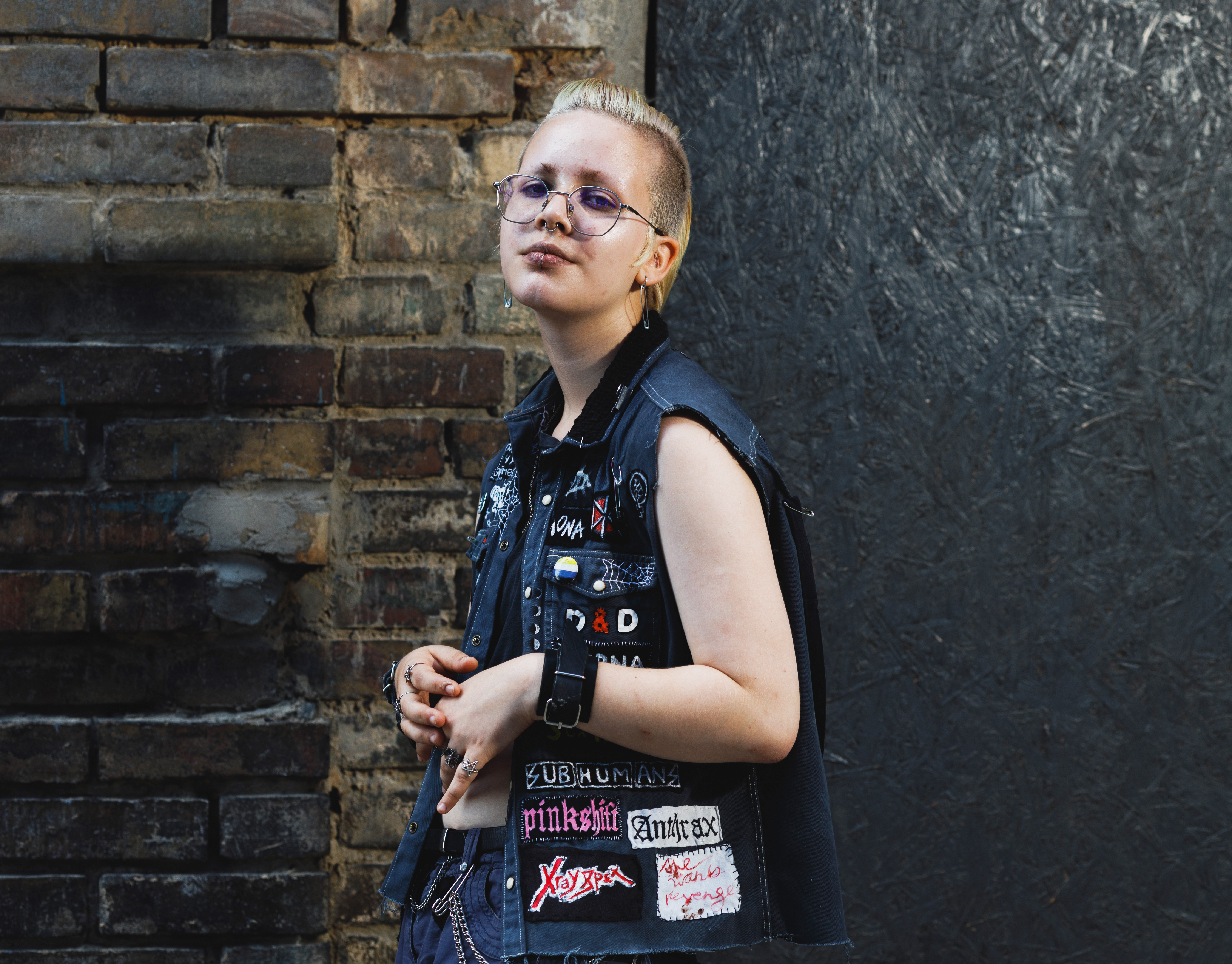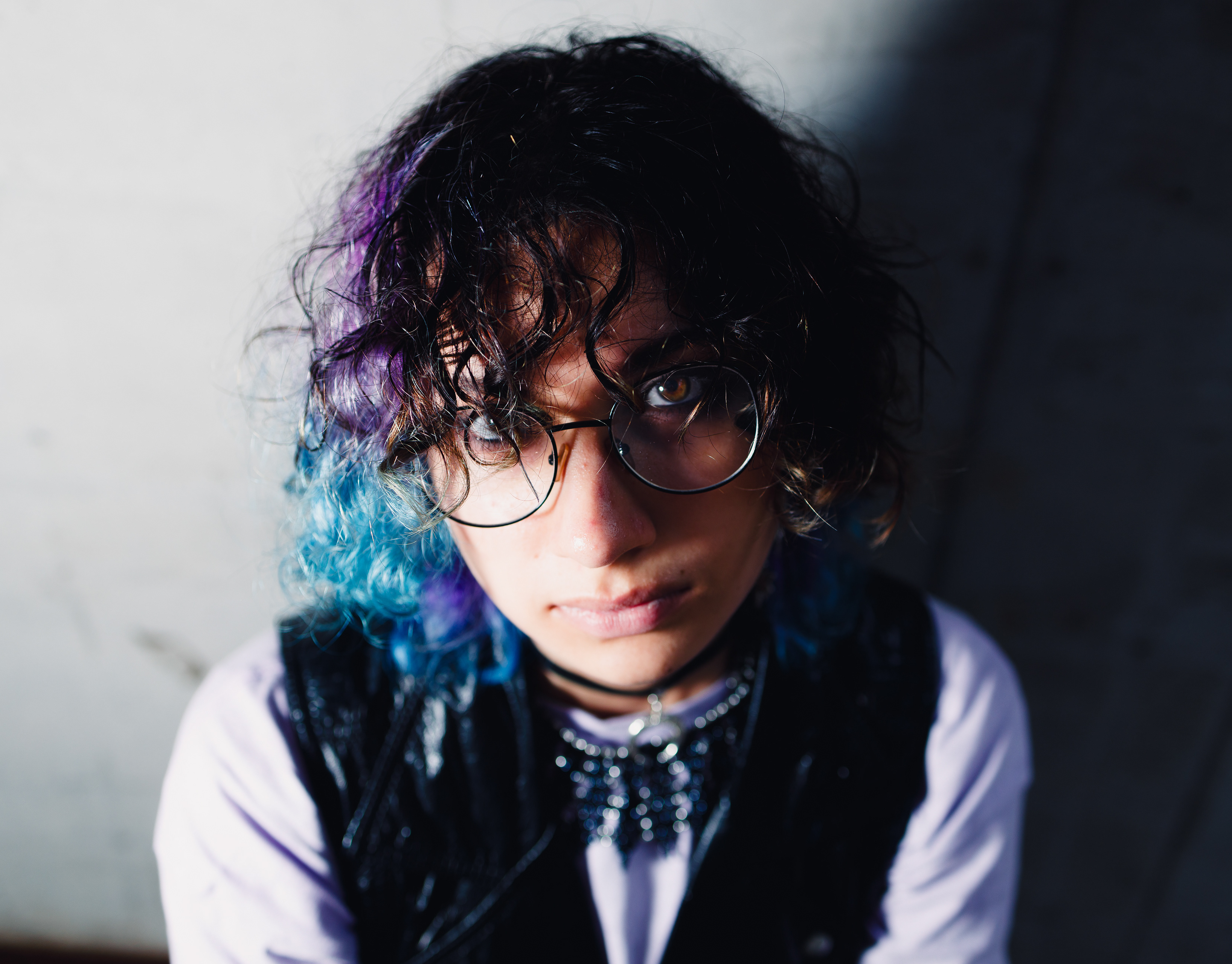Frederick poses for a photograph in Holosiivsky Forest, Kyiv, Ukraine, July 2024. “Growing up will fix it — that was the slogan of my self-discovery. But it didn’t. Figuring myself out did,” he shared. Photo by Saf Homin.
WHO AM I?
My conscious life began with my interactions at the Kyiv Zoo and the educators working there. Since I was nine years old, I spent a lot of time there: attending workshops, going on field practices. When I was writing a research paper for the Junior Academy of Sciences of Ukraine (a program that promotes scientific development among schoolchildren), I visited the zoo at least twice a week.
When you’re working on a scientific paper, you keep coming back: “Is this table okay? Are these data accurate? Is this literature relevant?” It’s impossible not to communicate closely, and that’s how I became part of the team.
The people who’ve known me since I was a child now respect me and my pronouns and have seen me grow up. Today, I work in the zoo’s information and educational department. Before the full-scale invasion, we organized events and educated people about ecology: how to avoid harming animals, not to throw away batteries, and so on.
I remember my first vivid childhood memory: at five years old, I asked my parents, “Who are transvestites?” [Laughs]
My parents told me, “Live and think about it; you’re still little, it’s too early.” Around the age of 11, I began to sense that something was wrong, something didn’t fit.
At the Kyiv Zoo, the people I befriended were older, and some people who worked there were queer. There were people who at the time didn’t yet identify as nonbinary but now use pronouns like “they/them” or “she/they.” We’re still in touch, and there are many such people. They supported me back when I was young, and it helped me avoid self-rejection. I’ve had a very positive experience; everyone supports me.
“The people who’ve known me since I was a child now respect me and my pronouns — they’ve seen me grow up,” says Frederik.
At that point, I thought, “Oh, wow, nonbinarity exists; this sounds like me,” and then, around the same age, I thought, “No, I’m still young”. I felt bad about puberty, the binary system — it was all nonsense, but I decided to wait. Growing up will fix it — that was the slogan of my self-discovery.
And then the full-scale invasion began. The dysphoria was already there, but the issue remained unresolved — I felt like “nobody”. At that time, I was studying in medical college with a heavy workload: full-time day classes, early morning commutes, and a job I had just started.
After the invasion, I finally got some sleep and had a lot of time to think. That’s when I said, “Alright, time to fully figure myself out”.
I realized I was “queer.” Since 2020, I thought any pronouns worked for me because it didn’t matter, but I still didn’t know who I was. Over time, I figured out I belonged under the nonbinary umbrella and decided not to overthink it anymore. I’m probably agender, but I don’t usually correct people when they call me transmasc, nonbinary, or demiboy. I think, “Fine, it’s all under the same umbrella. I don’t care”.
“I don’t feel the need for a full transition,” Frederik says. “I just want to exist — not explain.”
COMING OUT
It was very easy to come out to people I literally grew up with, like my close friend. They simply noticed that I used “he” and “they” pronouns more often than others and asked about it.
The same goes for my studies. My classmates just suspected something, and I said, “Well, yeah, this is it.” Later, when we switched to online classes and then back to in-person learning, they were very kind. They said, “We noticed — how should we address you?” These are the people I communicate with.
At work, I have a young team, and coming out to them was also simple. One colleague helped me figure myself out and rid me of fears about myself; I’m very grateful to her for that. She’s queer herself and basically took me under her wing.
When I came out to my family, they just ignored it. They don’t support me, but they don’t bully me either. They haven’t kicked me out and don’t forbid me from changing my name. Their reaction was, “Okay, but we won’t call you that”. My younger brother is still little, but I believe I’ll be able to talk to him openly one day. I think he won’t grow up transphobic.
GENDER TRANSFORMATION
Sometimes I think about transitioning. People tell me I’m already perceived as I want to be, except for my colorful hair.
But will I give up how I look just to match gender perceptions?
I’m considering taking testosterone to expand my vocal range so I can speak lower. But I don’t want a very deep voice — I want it to be ambiguous so that people can’t figure me out. My goal is to confuse people a bit, to make them unsure of my gender, so their thoughts stop at “we’re not sure who this is”.
I don’t feel the need for a full transition. I just want to keep people guessing.
Maybe I’d like top surgery (mastectomy) and to get a bit more muscular, but drastic changes — probably not.
Frederik’s backpack. “I’ve had many names — Frederik, Stas, Dwarf. But I want everyone to call me Frederik, so they don’t confuse me and others,” they said.
INTELLECTUAL FAMILY
There’s an older team at work — people in their 30s and 40s. They’ve known me since I was little but still use the right pronouns. I call one of them “mom”. Mom, if you’re reading this — thank you. One day I just asked her, “Mom, can you call me this?” She agreed.
We have a biology department and an in-house psychologist. They’re very sweet; we often talk and spend a lot of time together. They’re my intellectual family. I explained to them about umbrellas (gender and identity) and nonbinary concepts.
After Nemo’s victory (Editor’s note: Nemo is a nonbinary artist from Switzerland who won Eurovision 2024 with the song The Code, becoming the first openly nonbinary winner in the contest’s history), Mom Zhenya asked me to read an article by a philologist about using “they” correctly to see if it was accurate. I explained it.
Older colleagues are constantly learning, accepting information about pronouns, genders, and living with it normally. They accept me and people in general.
“Older colleagues are still learning, asking questions, accepting — not just me, but people in general,” Frederik reflects.
BETWEEN NAMES AND PROFESSIONS
I wanted to change my name a year ago, but due to enrollment, I had very limited time to properly update all my documents. The Administrative Services Center is a rather chaotic organization. I spent six months trying to get it done. They had issues with changing surnames, and then someone went on vacation, and I was essentially dismissed.
The Administrative Services Center turned out to be the most homophobic and transphobic.
Right now, I can’t deal with it because I need my documents for enrollment and graduation. When I enroll, I’ll just say, “Don’t issue me a student ID”. That’s my plan for now.
When I finish medical college, I’ll become a junior specialist in laboratory diagnostics. It’s an unpopular specialty that covers clinical analyses, working with biomaterials, and studying bacteria. Lab diagnosticians work in labs — histological, pathological, or even in morgues and forensic departments — conducting research without direct contact with people.
I’m balancing on the edge of medicine and biology. I plan to enroll at Shevchenko University, where they have a separate lab diagnostics bachelor’s program. It doesn’t really make much sense, but afterward, I’ll go straight to a master’s program and become a laboratory physician, a true medic.
My department at Kyiv Zoo is engaged in educational and social work. During our existence, we have implemented many different initiatives. Currently, the main areas of our activity are: a youth club, cooperation with the Kyiv City Rehabilitation Center for Children with Disabilities, several psychological support projects, educational events in schools and intra-zoo events dedicated to environmental dates, such as Nature Day, Bat Night, or Wildlife Day. Our department is also working on a project that can confirm the effectiveness of zootherapy.
Sometimes during events, we interact with people and bring specially trained animal assistants. I usually don’t mention my name, like others. If there are complaints or someone dislikes something, I’ll simply take the animals and leave. At the zoo, I won’t explain anything to people — I’ll just call my colleagues, who always understand and support me.
I can’t completely avoid my passport name, but most adults who know it don’t use it. Where it’s required, it’s there. My classmates: some use my passport name, others asked and call me what I requested.
In the internet era, I’ve had many names: Frederik, Stas, Dwarf. Most people know me as Dwarf, but there are other names, including my passport name. I just ask people not to add new names; there are enough already. At work, they call me Stas; online, it’s Dwarf. But I want everyone to call me Frederik after I change my name, so they don’t confuse me and others.
Editor’s note: At the time of publication, after four hours at the Administrative Services Center and 200 hryvnias [around $5 at the time] in expenses, Frederik managed to change his name in his passport. He graduated with honors from PCFMC (First Kyiv Professional Medical College) and enrolled in the Shevchenko University. His classmates call him “Fred”.
The interview took place in Kyiv on June 13, 2024.







